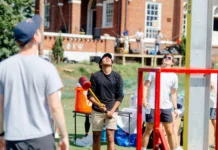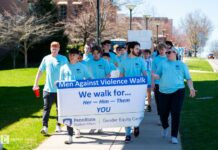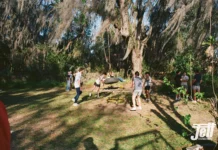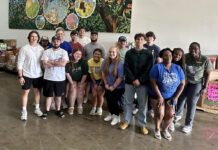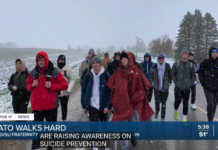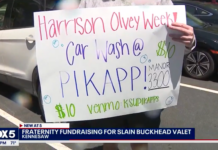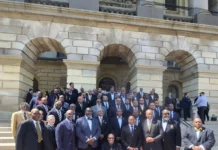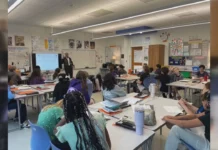WVU’s second annual Prevention Summit capped off the 2023 Hazing Prevention Week with discussions on substance use disorders, sexual assault, hazing and more.
The summit took place in the Mountainlair Ballroom Friday and occurred in partnership by WELLWVU, the Division of Diversity, Equity and Inclusion, the Center for Fraternal Values and Leadership and the Office of Student Rights and Responsibilities.
The summit held a screening of the documentary “Breathe, Nolan, Breathe,” which tells the story of Nolan Burch, a WVU student who died from hazing in November 2014.
Tears filled the eyes of WVU Greek Life members and summit participants who gathered to watch the screening.
Kim Burch, the mother of Nolan Burch, answered questions during a discussion panel following the screening.
Kim Burch shared details on her current relationship with WVU and the advocacy work that she continues to do for hazing on college campuses.
“Nolan loved it here. You can see why, it’s beautiful. We said right away, ‘We need to make change.’ We don’t want this to happen to another child,” she said.
Kim and TJ Burch continue to share their son’s story to middle school, high school and college students at both in-state and out-of-state institutions.
Kim Burch and Director of the Center for Fraternal Values and Leadership Matthew Richardson stressed the importance of safety in campus organizations and of following the University’s medical amnesty policies when an emergency occurs.
The summit provided students with resources and workshops centered around prevention on campus.
Courtney Weaver, director of WELLWVU, said that prevention is a broad topic that can be applied to many topics, including mental health, sexual health, substance use and more.
“I hope folks understand how much work goes into prevention, why it’s important and that they learn that everyone can play a role in the creation of a healthier campus, even if they don’t think that their job or their major or anything like that has anything to do with prevention,” Weaver said.
Marie Cosgrove, international inspirational speaker from Dayton, Ohio, served as the opening plenary speaker at the summit and shared her experience with sexual violence.
“I thought I was the only one,” Cosgrove said. “I thought there was no one who had gone through what I’ve gone through, and we need to be able to share because it’s very healing when you’re able to walk in the truth. And for so long, I was walking in shame.”
Cosgrove shared statistics revealing that sexual violence is more common on college campuses than other crimes.
According to campus statistics from the Rape, Abuse and Incest National Network, 26.4% of undergraduate females and 6.8% of undergraduate males experience sexual assault or violence on campus.
“The numbers are going down but not fast enough,” she said. “I think we can come to a day where it’s just absolutely not tolerated.”
Cosgrove discussed different types of assault and violence that victims experience, as well as the impact that sexual violence has on a victim’s life. She mentioned some signs that people can look for if someone they know needs help.
More information on how to help victims of sexual assault can be found on WELLWVU’s website.
Cosgrove also suggested students utilize WVU’s safety escort service if they feel unsafe while on campus.
Participants had the opportunity to attend breakout sessions, explaining how to take preventative measures when confronting situations that commonly occur on college campuses.
The sessions included training for recovery allies, Narcan training, advocacy on campus, educational programming through the Office of Student Rights and Responsibilities and more.
The full itinerary with the list of WVU organization-led breakout sessions can be found on WELLWVU’s website.
Richardson talked about the importance of preventing Greek Life hazing at the summit’s closing.
“We need to recognize that we’re inherently up against a challenge … You have to have the courage to come forward and say, ‘This can’t happen, and we don’t want to be in a position to make it happen,’” he said.
Students who experience hazing can submit a report through the WVU Center for Fraternal Values and Leadership.

